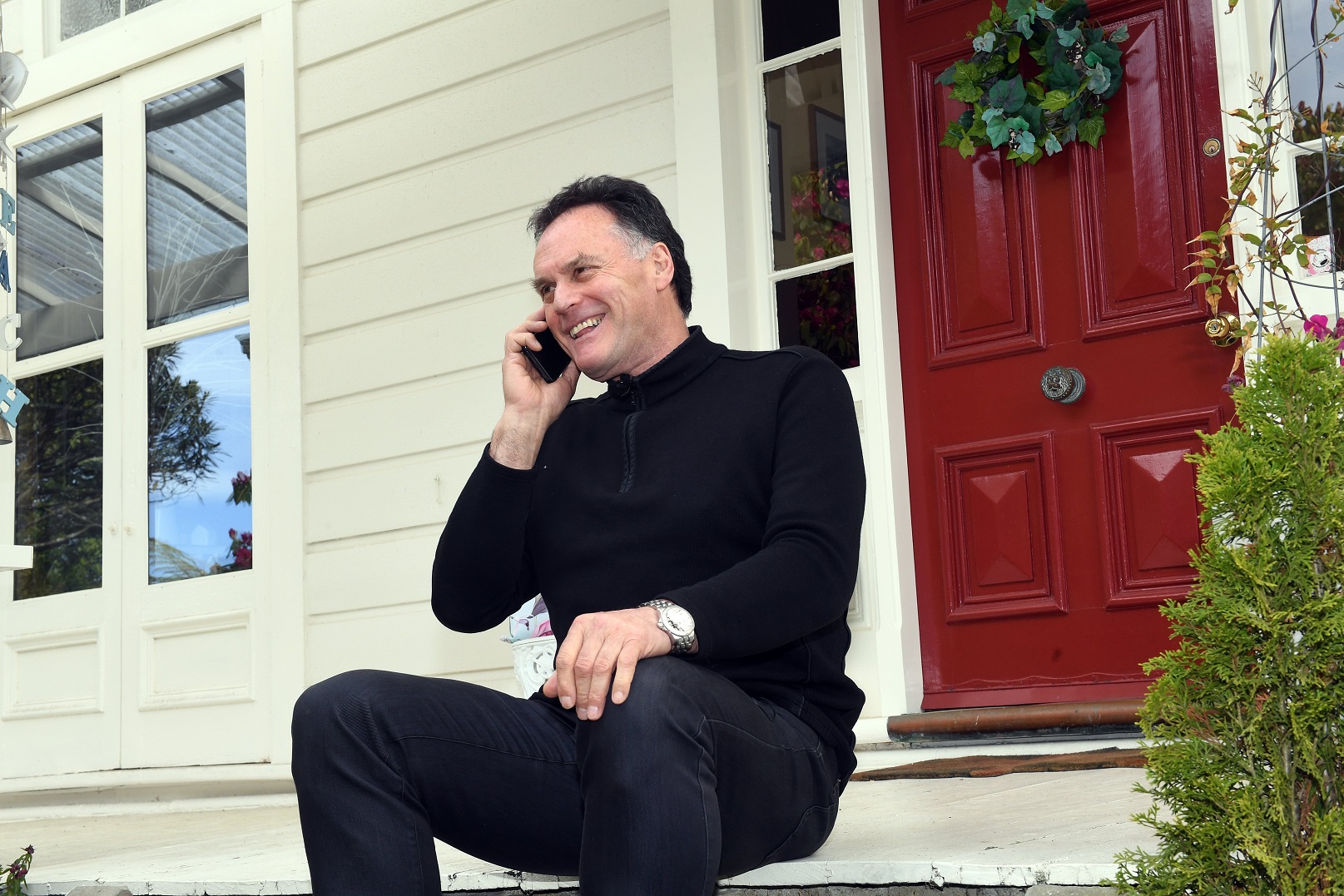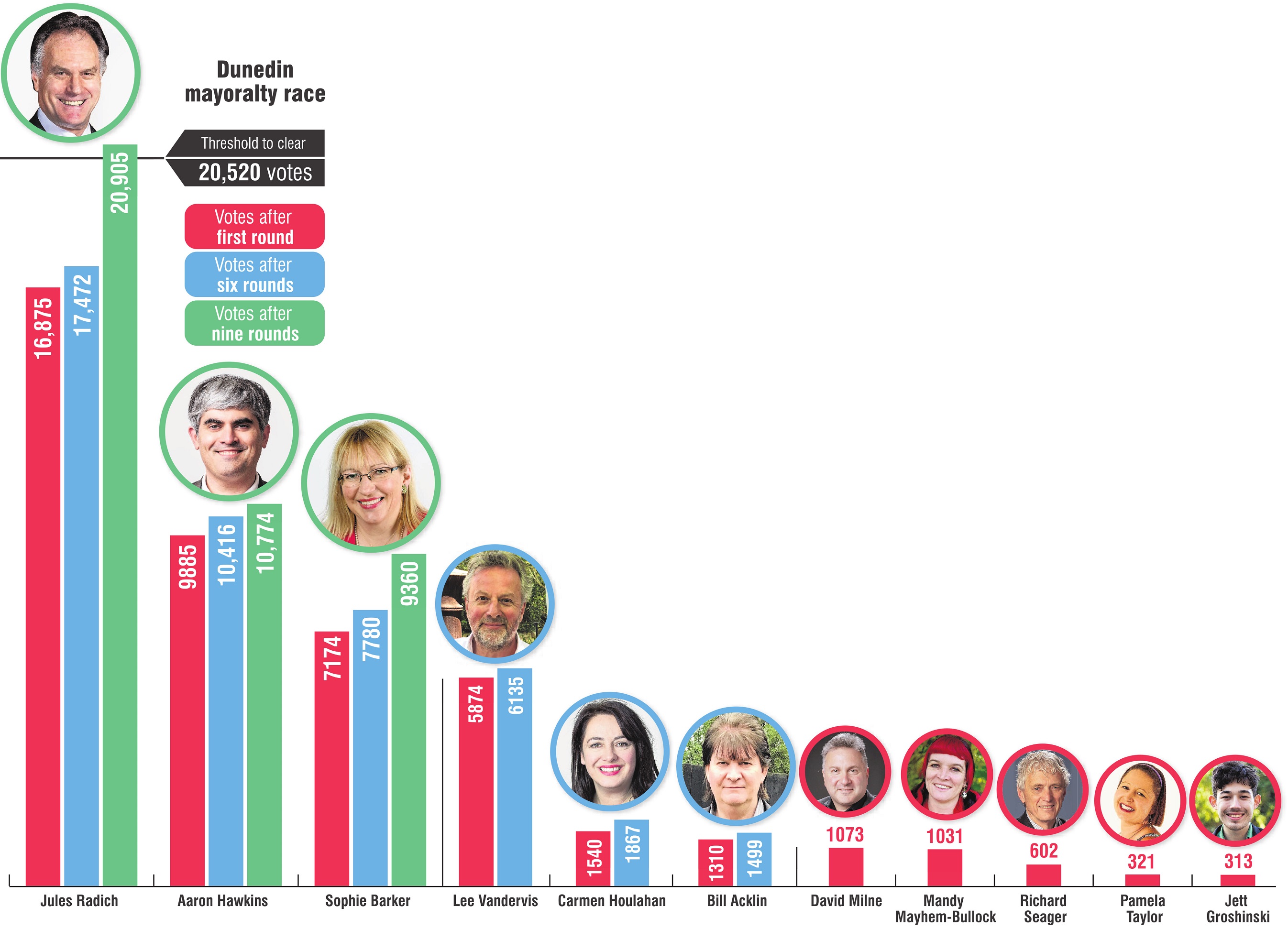
It may well have been quickly obvious for the people counting Dunedin votes how the race for the city’s mayoralty was going to turn out.
Thousands more people wrote "1" next to the name of Jules Radich than they did for Aaron Hawkins, or anybody else. Some unusual voting patterns would have been needed under the single-transferable vote (STV) system to deny Mr Radich from there, as he was well along the path to victory.
It would seem Mr Hawkins, the incumbent, was well behind in second, not a great distance ahead of third-placed Sophie Barker.
When Mr Radich received a phone call from the Otago Daily Times on Saturday afternoon, the one-term councillor had moments earlier been told he would be Dunedin’s next mayor. At that stage, about 90% of the vote count had been completed and he had been advised the margin was clear.
Senior councillor and mayoralty candidate Lee Vandervis congratulated Mr Radich on "a massive landslide vote" and wished him the best of luck in the hot seat.
Mr Hawkins may well have felt like he was buried in the rubble and the result was certainly decisive. However, the precise magnitude of the loss is a big unknown. That is a quirk of the way STV results are reported, especially when races are not tight.
Under STV, majority support from voters is needed to win the mayoralty and the least-preferred candidates drop out of the race one by one and their votes are redistributed until the winner clears the 50% threshold. It all happens through a ranking system and a series of calculations.
The 9360 votes that ended up in the column of Cr Barker after the preliminary count did not need to be reallocated because Mr Radich had already won, clearing the bar that had been set at 20,520 votes. Many of Cr Barker’s supporters may have opted for Mr Hawkins as their next-preferred choice, but Mr Hawkins was short even if all of them did. Combining the vote of the runner-up (10,774) and second runner-up (9360) would take the total to 20,134, and Mr Radich had assembled 20,905 by then.
Much can still be read into the numbers that are available.
One of the best indicators of where the race was at came after the STV calculator ran through eight rounds, or iterations. At this point, Mr Radich had 18,281 votes in his column, Mr Hawkins had 10,631, Cr Barker had 8690 and Cr Vandervis had 6453. Cr Vandervis then dipped out and the resulting redistribution of votes went well enough for Mr Radich for him to claim the mayoral chains.
Incidentally, we can see how the votes for Cr Vandervis were divvied up for the candidates that remained in the race. After eight rounds, Cr Vandervis had accumulated 6453 votes. Mr Radich benefited by receiving 2624, Cr Barker got 670 of them and Mr Hawkins received 143. More than 3000 of the votes that were with Cr Vandervis went nowhere, because these supporters did not give a ranking to the three candidates still in the race once he was eliminated.
Overall, Mr Hawkins was ousted both because he did not get enough first preferences and because he did not pick up much support when candidates dropped out of contention.
Redistribution of votes benefited him by 889.
For Mr Radich, it was 4030.
For Cr Barker, it was 2186.
Comparing elections under STV is difficult, because of complexity, but some trends are clear enough.

What he did not do was build on his support.
Mr Radich clearly did. His first-preference percentage shot up from under 10% to more than 35%.
Core support for Cr Vandervis — second in 2019 and fourth in 2022 — dropped away. His first-preference percentage exceeded that of Mr Hawkins in 2019, but was off the pace this year.
Was this year’s mayoralty win a landslide?
It was clearly the most decisive result since 2013. On that occasion, the late Dave Cull was easily in front of his two nearest challengers — Hilary Calvert and Cr Vandervis.
Cr Vandervis was emphatically the most-preferred councillor in 2019, but he was pipped for that position by Cr Barker this year, the preliminary count shows.
The two councillors were significantly ahead of anybody else, but others who crossed the threshold in the first round were Brent Weatherall in third, Marie Laufiso (fourth) and Andrew Whiley (fifth).
Cr Barker had 7194 votes for council, Cr Vandervis 6256 and Mr Weatherall 3742, when the threshold for election to the council ended up at 2650.8 votes.
David Benson-Pope is one councillor who has slipped down the list.
On the preliminary count, Cr Benson-Pope is 13th out of the 14 who made the cut, dropping from sixth.
This time, it took 41 iterations of the calculator to confirm Bill Acklin was sixth on the preliminary count and Christine Garey seventh.
Another 10 iterations of the calculator had Crs Jim O’Malley, Carmen Houlahan and Steve Walker in eighth, ninth and 10th.
Kevin Gilbert crossed the threshold after 61 rounds, Mandy Mayhem-Bullock after 70, Cr Benson-Pope 71 and Cherry Lucas 74. Cr Rachel Elder, the highest-polling unsuccessful candidate, was excluded on the 74th iteration.
Preliminary results are released when all of the ballots, apart from special votes, have been counted.
The final tallies, including special votes, are due today.












